UK baby banks explained: Where to find your local baby bank and what to donate
We explain how baby banks work, where to find your nearest baby bank, what can be donated and how to start your own
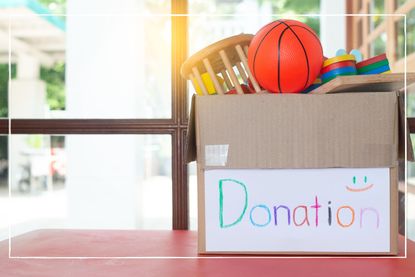
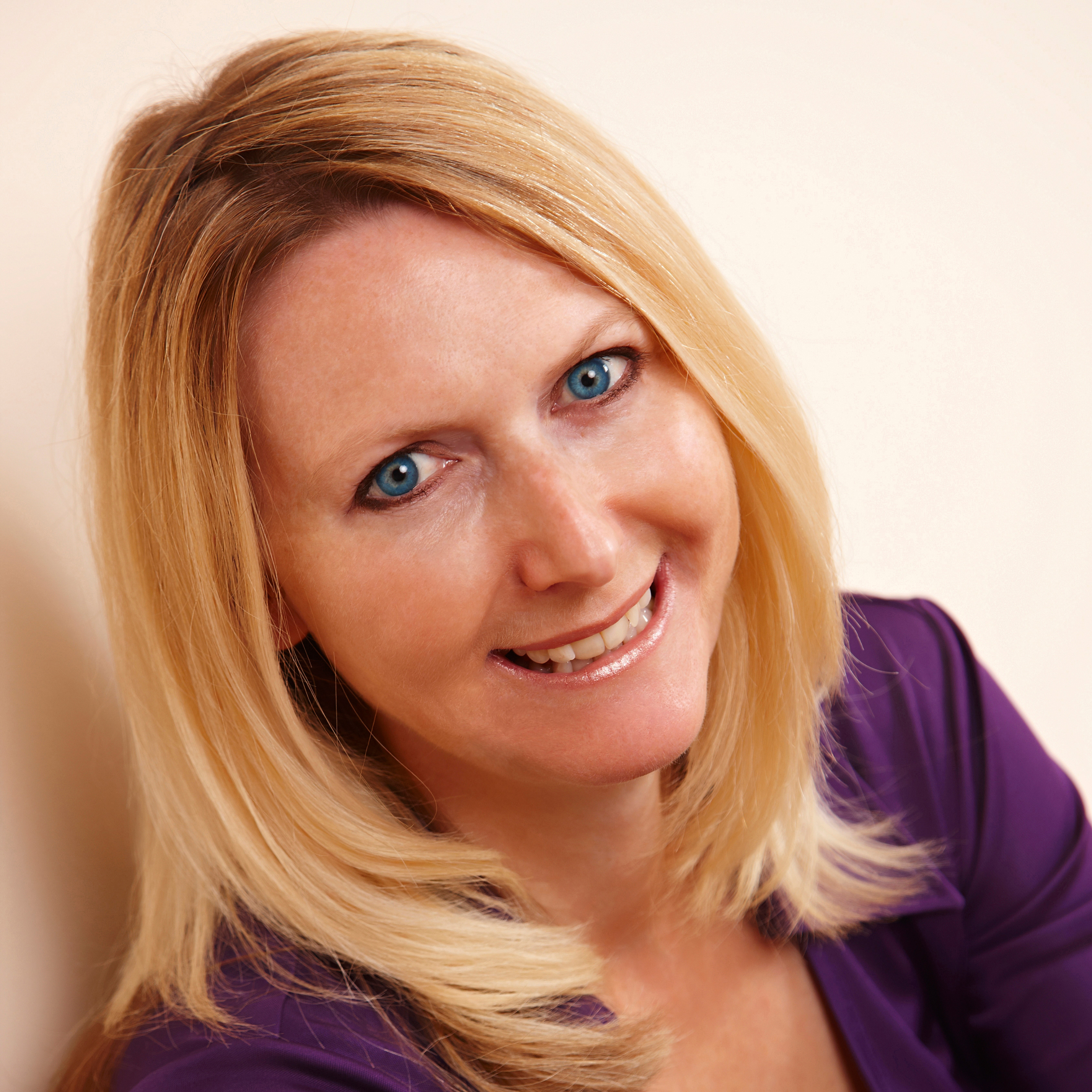
Recent updates
This article has been updated to include additional details on what a baby bank can and cannot provide, as well as how to start your own baby bank. We have also added more expert comment from those who run baby banks and removed any out of date information.
If you're looking for your nearest baby bank, whether you want to use one or donate to one, you're not alone. Cash-strapped families are struggling to afford even the most basic baby items amidst a backdrop of high inflation, rising mortgage rates and high food costs.
And the cost of raising a child is on the rise too, considering that the price of nappies and baby wipes has soared, and formula milk is up 45% over the last two years, according to data from First Steps Nutrition Trust. If you are not breastfeeding your child, for whatever reason, it's useful to know how to get free baby formula if you need it and can't afford it.
As a result of rising prices, an increasing number of parents are now relying on baby banks for baby essentials that they simply can’t afford. The Hartlepool Baby Bank has seen the number of requests for help triple over the last four years. Founder Emilie de Bruijn says: “Families are desperate with rent increases as well as rising food and energy bills and while pre-Covid, we were seeing 50 families a week, we now see 170 a week, with at least 50 new ones every month”.
Stripey Stork baby bank in Surrey has also seen a 64% increase in requests for help over the past year and given out over £1 million worth of essentials to families.

What is a baby bank?
A baby bank works in a similar way to a food bank, but instead of giving out food, families can get free baby items. This can include nappies and toiletries, clothing, cots, prams, highchairs and toys. With the exception of toiletries and nappies, most items are pre-loved donations, but must be in good condition.
Baby banks don’t only provide help for babies, however. With some you may be able to get clothing and items for children up to age sixteen. Nicola Dawes, founder of Surrey based Stripey Stork says, “We believe it’s important to help older children in families too”.
“We often hear of cases where children don’t go to school because they don’t have the right uniform and we can provide non-branded school uniform, school bags and shoes”.
GoodtoKnow Newsletter
Parenting advice, hot topics, best buys and family finance tips delivered straight to your inbox.
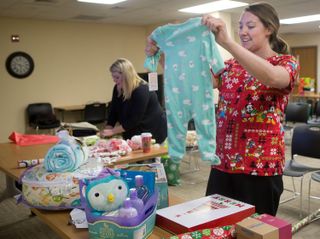
How to find your nearest baby bank?
The easiest way to find your local one, along with contact details, is by checking the Little Village website. You can also search for baby banks on Facebook to find one near you. There are over 200 baby banks across the UK with locations from Plymouth to Carlisle and Belfast to Lowestoft.
But we've listed a few options to help you find a baby bank near you:
- Little Village has five locations across London in Camden, Wandsworth, Brent, Hackney and Hounslow.
- The Small Project in Lambeth North, South London
- Best Start Baby Bank in Eastbourne
- Ten Little Toes Baby Bank is based in Cowfold, West Sussex
- Lloyd Park Children's Charity supports families in Waltham Forest and the surrounding area
- Stripey Stork offers support in East Surrey
- Cascade Family Essentials in Cheshire that helps families with children up to the age of 10
- The Salvation Army have a baby bank in Ilford, Essex and also in Ealing
- Baby Bank Network is based in Bristol, but also have branches in Aberdeenshire, Exeter and Isle of Wight, all run as separate Baby Banks.
- Baby Godiva in Coventry
- The Baby Bank HQ operates in Barking, Dagenham, Havering, and Redbridge
- Baby Basics have locations all over the UK, including Devon, Northern Ireland, Wales and Scotland
- Hartlepool Baby Bank offers support to those in Hartlepool and it's surrounding areas
Some baby banks have several locations, like Little Village, with outlets across London, while others may be independently run from a community centre or small warehouse unit. While Little Village run baby banks across London, its website lists others across the UK, and if you run a baby bank, you can ask for your contact details to be included.
Baby banks are usually run by local volunteers, which means they’re not open round the clock and may only be open for a couple of hours a day. Depending on the baby bank, once you have a referral, you may then be invited to go along, or have a parcel delivered to you. Anything you are given from a baby bank is free.
Some also offer a support network where parents who are struggling financially or emotionally can pop in for a chat as well as picking up items for their children.
What do baby banks provide?
Baby banks can usually provide families with everything from basics like nappies and toiletries to clothing and more costly items like highchairs, cots and baby baths.
The choice of items available may vary according to the individual baby bank, but the list below gives you an idea of what they can supply.
- Nappies
- Wipes
- Baby toiletries and sanitary products (new)
- Baby baths
- Cots
- Changing bags
- New mum starter packs with sanitary items and hospital bag essentials
- Blankets
- Clothing and shoes
- High chairs
- Maternity clothing
- Moses baskets
- Carrycots
- Baby slings
- Changing mats
- Prams and pushchairs
- Stair gates (pressure fit)
- Sterilisers
- Toys and books
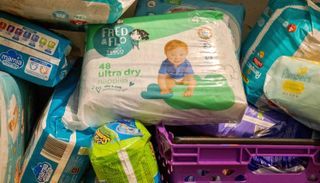
What can't you get from a baby bank?
Items you may not be able to get from a baby bank include:
- Formula milk
- Car seats
- Used mattresses
- Used baby bottles
- Potties and toilet seats
- Electric bottle warmers
- Large stuffed toys
- Large ride on toys and trikes
- Door bouncers
- Duvets and duvet covers
- Cupboard locks and safety equipment
- Electric breast pumps
How can I use a baby bank?
There’s no set criteria to use a baby bank, however they aim to help low income families who are struggling financially. In most cases, you’ll need a referral, as you would with a food bank, and this could be from your midwife or GP, health visitor or social worker, church, food bank, or your child’s school or nursery.
Baby Bank Network founder, Becky Gilbert says, “We don’t meet the families ourselves, as the referral partner contacts us on the family’s behalf. They then tell us what the family needs, and we get everything together, package it up, and the referral partner collects it and gives it to the family”.
With other baby banks, once you have a referral, you may be asked to tick a list of items needed online and either collect them yourself, or in some cases, with larger items, they could be delivered to your door.
Remember if you're not eligible to use a baby bank, there may be other avenues of support for you out there such as the tax-free childcare allowance or the option to claim universal credit.
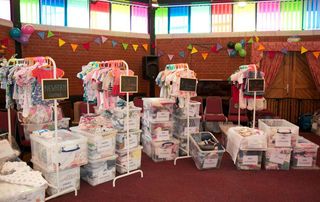
Clothes donated to Little Village baby banks in London (Credit: Little Village HQ)
How can I donate to a baby bank?
If you want to help by donating to a baby bank, the first step is to contact your local one, by checking its website or Facebook page, and find out what’s needed. Some baby banks have a wish list of items needed on their website. This is to ensure they are not overstocked, especially as many are run from locations with limited space. If you don't have any suitable items to donate, volunteers are also needed, as well as financial support.
Safety is paramount when it comes to giving out large items like cots, highchairs, pushchairs and prams. “We’re very strict on safety standards and everything must be there with instructions and fittings. And when we send a cot out we will always include a new mattress”, says Stripey Stork's Nicola Dawes. “If you don’t have the instructions, we have links on our website so you can find them and print them off and we have a team of around 150 volunteers who jet wash buggies and check items and instructions and make sure everything works”.
When it comes to dropping off your donations, it’s best to check the website regarding the best time to drop by with donations. With some baby banks like the Baby Bank Network Bristol, you may have to book a delivery slot to drop items at its warehouse and worth knowing that most baby banks can’t offer a collection service.
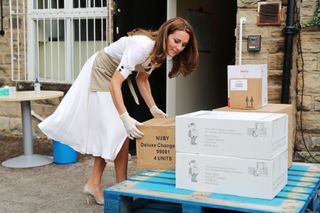
Kate Middleton helps to unpack supplies during her visit to Baby Basics baby bank in Sheffield
How do I start a baby bank?
If there isn’t a baby bank in your area, you could start one yourself. This is exactly what Becky Gilbert did eight years ago when she founded the Baby Bank Network Bristol from her living room. “I once had eleven prams in my dining room and volunteers had their bedrooms full of clothes, before we moved items to storage.
“You need a good team around you as there’s a lot of think about with health and safety and public liability insurance if you have people coming to your home”.
On a practical basis, you need to think about where people can come to donate and collect items, which is why many more established baby banks are run from venues like community centres or warehouses, instead of someone’s home.
Once you’re established, setting up as a registered charity can open the door potential funding says Sue Bain, founder of Little Treasures Baby Bank in Horncastle, Lincolnshire. “I set up from my spare room in 2019, but within six months we were too big and decided to become a registered charity as this can help with getting funding and premises.
“I went on the Charity Commission website, it was very straightforward, and we now have a warehouse and have just secured lottery funding of £28,000 over the next five years”.
'I'm so grateful... but it's a shame so many parents are in need'
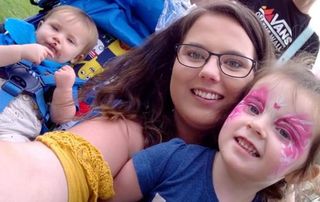
Emelynne used Baby Bank Scotland to clothe her children
Speaking to Goodto, mum-of-two Emelynne Byers, shares her experience of using a baby bank. Emelynne used Baby Bank Scotland after facing a number of difficulties including post-natal depression, which resulted in her having to quit both her job and further education in Childhood Studies, and breaking up with the father of her children.
She says: "I applied for Universal Credit so that I could build myself back up and get back on my feet but there were some unexpected problems and I didn’t get payment [straight away]. I did ask for a crisis grant and was given a little money but it wasn’t enough to cover everything so I had to leave my house and move in with my mum."
Emelynne didn’t know about her local baby bank until a friend mentioned it, by which point she was in dire need. "I couldn't afford clothes for my children but then my friend referred me and Baby Bank Scotland contacted me. I only used the service once but I received three huge bags filled with clothes for both of my children and a bag of nappies, which was all such a great help as my children had a growth spurt and I couldn't afford any clothes or nappies for my son."
You might also find it useful to know about any benefits you can claim while on maternity leave or whether it's financially worth returning to work after having a baby.
Video of the week:
- Debra WatersFreelance Lifestyle Writer
-
 Five categories of grandparent have been identified by psychologists, and we all want number #2
Five categories of grandparent have been identified by psychologists, and we all want number #2Psychologists studying the impact of grandparents in the lives of children have identified five key types, and you'll probably recognise yours instantly.
By Lucy Wigley Published
-
 Millennial dads are doing 4 things better than previous generations, but is it enough to lighten the mother's mental load?
Millennial dads are doing 4 things better than previous generations, but is it enough to lighten the mother's mental load?Millennial dads are definitely doing better than their previous counterparts, but there's still areas they can improve on their parenting to be truly equal to their partners.
By Lucy Wigley Published
-
 'It isn’t a holiday – it is crucial bonding time' - 70% of dads can't afford to take two weeks paternity leave, according to new research
'It isn’t a holiday – it is crucial bonding time' - 70% of dads can't afford to take two weeks paternity leave, according to new researchThe research also found that only 14 per cent of fathers were ready to return to work mentally after taking their paternity leave
By Sarah Handley Published
-
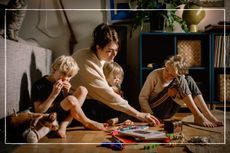 Two-child benefit cap 'pushes children into poverty' - campaigners urge government to scrap 'cruel policy' that impacts 1 in every 10 children
Two-child benefit cap 'pushes children into poverty' - campaigners urge government to scrap 'cruel policy' that impacts 1 in every 10 childrenThe controversial two-child benefit cap has met with strong opposition since its introduction in 2017
By Sarah Handley Published
-
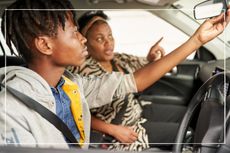 Gen-Z could be costing their parents £1,300 a year, by refusing to do this one thing (but it's not always their choice)
Gen-Z could be costing their parents £1,300 a year, by refusing to do this one thing (but it's not always their choice)It's not just parents who are facing the additional costs, the costs for Gen Z could be even higher
By Sarah Handley Published
-
 More than half of parents want to do this important thing for their kid's education but can’t afford to, according to new research
More than half of parents want to do this important thing for their kid's education but can’t afford to, according to new researchPressures on the family budget are preventing parents from paying for educational support outside of school
By Sarah Handley Published
-
 75% of mums feel guilty buying things if they earn less than their partners, according to social media poll, and the comments section was part heartbreaking, part inspiring
75% of mums feel guilty buying things if they earn less than their partners, according to social media poll, and the comments section was part heartbreaking, part inspiringSome mothers felt guilty for spending their partners money, while others saw it as household money instead
By Sarah Handley Published
-
 10 best zoos in the UK based on ticket prices, reviews and value for money
10 best zoos in the UK based on ticket prices, reviews and value for moneyThe best zoos in the UK have been determined based on a number of key factors, include prices, popularity, Trip Advisor ratings and how many animals they have
By Sarah Handley Published
-
 Child benefit is finally going to be made fairer - here's what's changing and when
Child benefit is finally going to be made fairer - here's what's changing and whenChild benefit is finally going to be made fairer - here's what's changing and when
By Sarah Handley Published
-
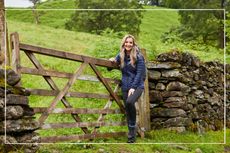 Mum-of-three Helen Skelton shares 5 free and easy ways to keep kids entertained in the Easter holidays (and they all involve one thing)
Mum-of-three Helen Skelton shares 5 free and easy ways to keep kids entertained in the Easter holidays (and they all involve one thing)Presenter Helen Skelton has revealed how parents can keep costs low when keeping the kids occupied during school holidays
By Sarah Handley Published